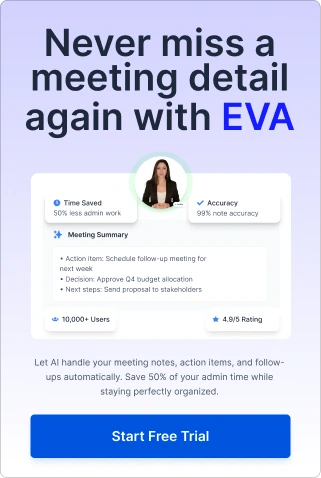Introduction to Real Life Examples how AI helps
CEOs, are you ready to work smarter, not harder?
In today’s fast-paced business world, staying ahead of the competition means leveraging every tool available to optimize your team’s productivity.
EVA Paradiso AI, a cutting-edge AI productivity assistant, is here to transform your organization’s operations. Whether automating repetitive tasks, enhancing decision-making, or streamlining workflows, EVA is the tool that every CEO needs to improve efficiency and drive growth.
Don’t let your competitors get ahead. By integrating AI for productivity into your business processes, you can automate routine tasks, boost efficiency, and focus your efforts on strategic initiatives that move the needle. This article’ll explore 15 real-life success stories showcasing how AI revolutionizes productivity across industries.
Let’s dive into why Real Life Examples how ai helps is a must-have for your business and how EVA Paradiso AI can give your company the needed edge.
What is AI for Productivity?
AI for productivity refers to the use of AI technologies, including machine learning (ML), natural language processing (NLP), and robotic process automation (RPA), to automate routine tasks, simplify workflows, and improve overall business efficiency. Key benefits include:
- Automating repetitive tasks: Freeing employees from mundane, repetitive work.
- Data-driven decision-making: Providing actionable insights that lead to smarter decisions.
- Reducing human error: Enhancing accuracy in data processing and task execution.
- Boosting employee productivity: Allowing teams to focus on higher-value tasks.
- With EVA Paradiso AI, your team has these benefits at their fingertips, empowering them to get more done faster and smarter.
The Importance of AI in Modern Work Environments
AI is becoming an essential tool in modern businesses for several reasons:
- Automating manual tasks: AI systems can handle everything from data entry to customer queries.
- Enhancing decision-making: AI tools analyze large datasets to help businesses make informed, data-driven decisions.
- Improving accuracy: AI reduces human error, ensuring tasks are reliably completed.
- Increasing productivity: AI frees employees from time-consuming tasks, allowing them to focus on creative or strategic work.
As a CEO, leveraging AI like EVA Paradiso AI is crucial for maintaining competitiveness in today’s ever-evolving business environment.
Real-Life Success Stories (Real Life Examples How AI helps)
1. AI-Powered Personalization in E-Commerce (Amazon)
Challenge: Amazon needed to personalize its shopping experience for millions of customers to increase conversion rates and drive repeat business.
AI Solution: Amazon uses AI-powered recommendation engines that analyze customer browsing history, previous purchases, and preferences to suggest personalized products.
Results:
35% increase in sales due to more accurate recommendations.
Higher customer retention thanks to personalized shopping experiences.
Benefit: Increased revenue and improved customer loyalty through personalized recommendations.
2. AI for Predictive Maintenance in Manufacturing (General Electric)
Challenge: General Electric (GE) faced frequent equipment failures, leading to production delays and costly repairs.
AI Solution: GE implemented AI-driven predictive maintenance systems that use machine sensor data to predict failures before they happen.
Results:
20% reduction in downtime by identifying issues early.
Significant cost savings by avoiding emergency repairs.
Benefit: Improved operational efficiency and cost savings in maintenance operations.
3. AI in Customer Support (Sephora)
Challenge: Sephora needed to provide faster, more personalized support with the increasing volume of customer inquiries.
AI Solution: Sephora integrated AI-powered chatbots that handled common queries, provided product recommendations, and tracked orders.
Results:
Reduced customer service costs by automating routine inquiries.
Faster response times, leading to improved customer satisfaction.
Benefit: Cost-effective customer support and improved response times.
4. AI for Sales Forecasting (HubSpot)
Challenge: HubSpot needed to improve its sales forecasting process to ensure more accurate predictions and better resource allocation.
AI Solution: HubSpot integrated AI-driven sales forecasting tools that analyzed historical sales data and customer behaviors to predict future trends.
Results:
More accurate forecasts, enabling better decision-making.
Improved resource allocation and optimized sales strategies.
Benefit: Increased profitability through improved sales strategies and data-driven decisions.
5. AI for Inventory Management (Walmart)
Challenge: Walmart faced inventory challenges, including stockouts and overstocking, due to fluctuating demand.
AI Solution: Walmart implemented AI-powered demand forecasting tools to predict inventory needs based on sales trends, weather patterns, and regional demand.
Results:
Optimized inventory levels, reducing stockouts and overstocking.
Lower storage costs by avoiding excess inventory.
Benefit: Reduced operational costs and better product availability, leading to increased customer satisfaction.
6. AI for Marketing Automation (Coca-Cola)
Challenge: Coca-Cola needed to improve digital marketing efforts and create more personalized campaigns for customers.
AI Solution: Coca-Cola used AI-powered marketing automation tools to segment audiences, personalize content, and optimize marketing strategies in real time.
Results:
Increased engagement with more personalized campaigns.
Higher ROI from improved targeting and ad spend optimization.
Benefit: More effective marketing with better customer targeting, leading to higher returns on investment.
7. AI for Fraud Detection (PayPal)
Challenge: PayPal needed a better way to detect and prevent fraudulent transactions in real time.
AI Solution: PayPal integrated AI-powered fraud detection systems to analyze transaction patterns and flag suspicious activity in real time.
Results:
50% reduction in fraud due to faster detection.
Fewer false positives, ensuring legitimate transactions were processed smoothly.
Benefit: Reduced financial losses and improved customer trust.
8. AI for Financial Planning (Wealthfront)
Challenge: Wealthfront needed to scale personalized financial planning without increasing its human advisor workforce.
AI Solution: Wealthfront used AI-driven algorithms to offer personalized investment advice based on clients’ financial goals and market conditions.
Results:
Custom portfolios created for each user, leading to more satisfied clients.
Increased client retention with personalized financial planning.
Benefit: Scalable financial services with improved customer retention.
9. AI for Employee Productivity (Slack)
Challenge: Slack wanted to help employees manage time better by reducing time spent on administrative tasks like sorting through messages and scheduling meetings.
AI Solution: Slack used AI-powered productivity tools that automatically categorize messages, set reminders, and schedule meetings.
Results:
Increased productivity by helping employees focus on core tasks.
Improved team collaboration with clear communication and task management.
Benefit: Increased team efficiency and better communication, leading to faster project completion.
10. AI for Recruitment (Unilever)
Challenge: Unilever struggled to manage the high volume of job applications and ensure a fair, bias-free hiring process.
AI Solution: Unilever integrated AI-powered recruitment tools to screen resumes, evaluate skills, and conduct initial interviews.
Results:
75% reduction in hiring time due to AI screening.
Bias-free recruitment improves diversity in the workforce.
Benefit: Faster recruitment and more diverse hires.
11. AI in Transportation (Uber)
Challenge: Uber faced inefficiencies in matching riders with drivers, leading to longer wait times.
AI Solution: Uber implemented AI-powered route optimization and demand forecasting, improving rider-driver matching and anticipating peak demand.
Results:
Reduced wait times for riders improve customer satisfaction.
Increased driver availability during peak hours, optimizing operations.
Benefit: Improved customer satisfaction and higher revenue through efficient matching.
12. AI for Customer Insights (Spotify)
Challenge: Spotify needed to improve user engagement by better understanding listening preferences.
AI Solution: Spotify used AI-powered recommendation algorithms to provide personalized playlists based on listening history.
Results:
Increased user engagement with more relevant content.
Improved retention due to personalized experiences.
Benefit: Higher user retention and increased engagement through AI-powered personalization.
13. AI in Agriculture for Crop Prediction (John Deere)
Challenge: Farmers needed more accurate predictions to optimize crop yields and manage resources effectively.
AI Solution: John Deere deployed AI-powered tools to predict crop yields based on soil data and weather conditions.
Results:
More accurate crop predictions leading to better planning.
Resource optimization, reducing costs and increasing productivity.
Benefit: Increased crop yield and lower operational costs.
14. AI for Real Estate Valuation (Zillow)
Challenge: Zillow needed to provide accurate, real-time home valuations due to fluctuating property prices.
AI Solution: Zillow used AI-powered models to predict home values by analyzing historical data, market trends, and property characteristics.
Results:
More accurate home valuations, improving buyer and seller decisions.
Faster transactions due to reliable price estimates.
Benefit: Improved customer trust and faster real estate transactions.
15. AI for Fraud Prevention in Retail (Target)
Challenge: Target needed to reduce fraud in its online transactions.
AI Solution: Target deployed AI-powered fraud detection systems to identify unusual transaction patterns.
Results:
Real-time fraud detection, preventing losses.
Enhanced security, improving customer confidence.
Benefit: Reduced fraud and improved customer trust.
Conclusion
AI is no longer a luxury – it’s necessary for businesses striving to remain competitive in the modern world. The examples shared above highlight how AI is transforming industries by automating tasks, enhancing decision-making, and boosting productivity. EVA Paradiso AI can help your organization gain these benefits by providing a productivity assistant that automates meeting notes, email responses, and more. By incorporating AI into your daily operations, you can improve efficiency and focus on what truly matters – strategic growth.
Key Takeaways:
- AI automates repetitive tasks and enhances decision-making, leading to improved business productivity.
- Businesses across sectors like e-commerce, finance, and healthcare are already reaping the benefits of AI.
- The future of AI in productivity is bright – it’s time to integrate AI tools like EVA Paradiso AI to stay ahead.
Embrace the future today. Book a demo of EVA Paradiso AI and see firsthand how AI can boost your team’s productivity.
Discover the comprehensive suite of AI solutions from Paradiso.
Visit our main hub at paradisosolutions.com to explore all our offerings, including specialized AI tools like those found at cognispark.ai. Empower your business with Paradiso One.
 Free
Free







